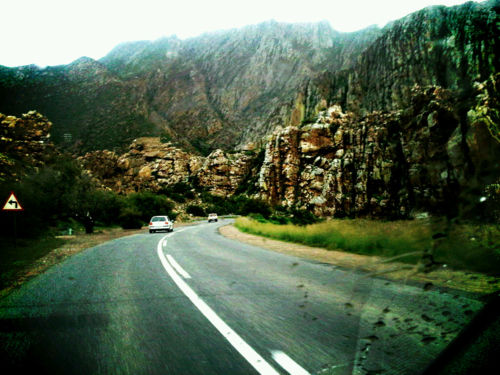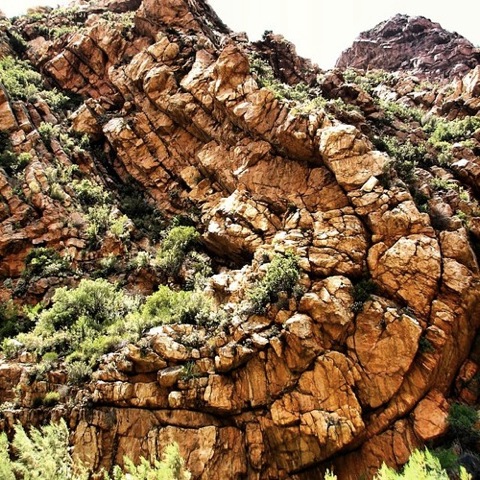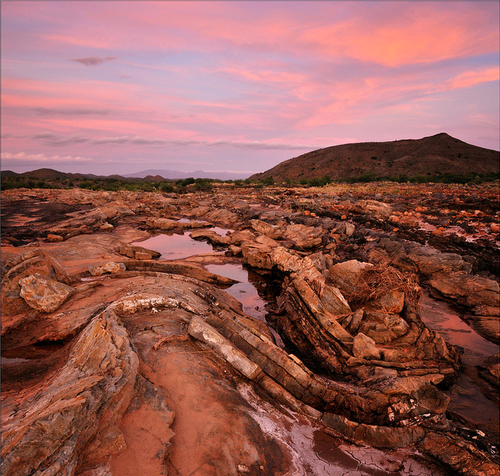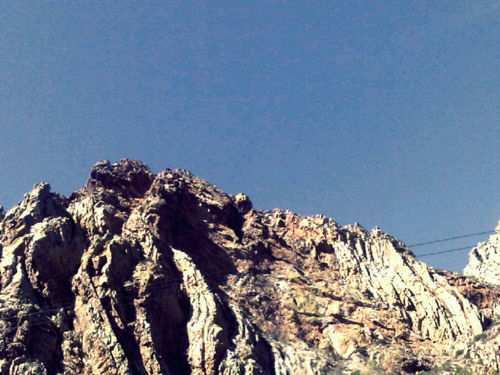No Reference Point: WWOOFing in the Karoo
 I went to South Africa immediately after I graduated from Dawson College in 2011. For the most part, I decided to WWOOF –World Wide Opportunities in Organic Farms. I spent the better half of the South African summer in the Little Karoo. Then, I returned again last year, this time as an exchange student at the University of Pretoria, South Africa’s capital. I spent 8 months abroad and, at the end of my trip I found myself on a farm in the Karoo, WWOOFing again. My time in South Africa has inspired me to curate a photo archive of amateur South African photography: fromsouthafricawithlove while I continue to pursue my interests in postcolonial theory, ecocriticism, and naturally postcolonial ecocriticism. While I manage the South African photo gallery as part of my interest in archival studies and South Africa, I hope to return to South Africa to do my MA at the University of Cape Town 2016.
I went to South Africa immediately after I graduated from Dawson College in 2011. For the most part, I decided to WWOOF –World Wide Opportunities in Organic Farms. I spent the better half of the South African summer in the Little Karoo. Then, I returned again last year, this time as an exchange student at the University of Pretoria, South Africa’s capital. I spent 8 months abroad and, at the end of my trip I found myself on a farm in the Karoo, WWOOFing again. My time in South Africa has inspired me to curate a photo archive of amateur South African photography: fromsouthafricawithlove while I continue to pursue my interests in postcolonial theory, ecocriticism, and naturally postcolonial ecocriticism. While I manage the South African photo gallery as part of my interest in archival studies and South Africa, I hope to return to South Africa to do my MA at the University of Cape Town 2016.

I decided to go to South Africa after meeting an Afrikaans girl in rural Vermont in the summer of 2009. We were coworkers but became good friends. At the end
of the season we got into a serious automobile accident. I had to go and see her again as a way to rectify our hospital bed “goodbye”. My voyages have contributed significantly to my academic interests, particularly with regards to the postcolonial.
The following journal is personal. It shares my experiences as I come straight from living comfortably in Montreal to the hinterland of South Africa.
Journal
“Why should it make sense at all? Is it not enough that it evokes?”
Zakes Mda The Madonna of Excelsior
June 17 2013
I tossed my way through another sleepless night on the foam mattress in the camper. I am somewhere in the Little Karoo, the desert, just east of Montagu and it is June. It is winter. It is also 3 am. I am five layers thick with socks and jacket and sleeping bag, Still, awoken by the cold. I fumble with the lock on the door of the camper, and trip over our propane heater - the kind that passed its last safety regulation never. The kind we could only use for 15 minutes at a time, or until we smelled enough gas enough to heed the warning of incineration, acc

ept defeat, and call it a night. That was all the warmth we were getting.
Simonskloof was about a three-hour drive from Cape Town, nestled in amongst the Langeberg mountain range of the Little Karoo proper. Unlike typical WWOOFing locations, Simonskloof isn’t strictly an organic farm, but rather a self-catering mountain retreat. It is much different from the 2 dimensional images I saw on the internet a few weeks back. It is nothing like WWOOFing 2 years ago, but funny to think I’m in the same area, Harland Farms must be only 250 km from where I am now.
Our days start early and we are working by 8. When I arrived there were two other WWOOFers here already. Mike, a Cape Tonian in his forties, who had committed to the entire season, and a Swiss nurse who’d grown tired of her job at home.
“What is this called?” That is my mantra. I am always asking. Mike can’t give me an answer, but if I’m lucky, he knows the name and if I’m very lucky, he knows the English translation. For the first week Mike and I were trail clearing, whacking away at the dense groves of fragrant fynbos (Afr. “fine bush”) with sheers and shovels and our language. It takes hours. There is an irony in naming something “fine” and “bush” especially because the shrub we were working on was a force to be reckoned with. But fynbos was only the kind of vegetation, I found out. Perhaps that was why it was so thick, so many different florae woven together, snarls of vine and flower, going up and growing out. We come in for lunch sweaty and breathless and wishing there was more than solar-powered water to shower with later on. We sit on the veranda for lunch and we are all too tired to speak about anything much. No one wants to talk about weeds.
An Interview
“Unimaginable perhaps; but the unimaginable is there to be imagined.”
J.M. Coetzee Slow Man
February 2014
What is different about the Karoo?
Karoo means “dry place”, it’s a Khoisan word. It stretches from the most southern point of Namibia into the western cape. The great Karoo is most of that area, and the Little Karoo is mostly in the Western Cape. One of the things that makes the little Karoo particularly special is that it is home to the Cape Fold, which is a kind of recognizable mountain scape that really demonstrates the waves and ripples of its formation. You can see the different layers of sentiment, the distinctive colours. It’s kind of like a language.
In what way is it like a language?
I’m trying to distance myself from being solely anthropomorphic in thinking that the only language is human language.
But animals have language, bees have language… Are you saying the land has a living quality?
Yes, in my writing on the Karoo before, I think I called it a “home to the pre-Cambrian gods, a place of Jurassic dreams” – Jurassic as in the era, not the dinosaur movies. I think it has a language because it has a history that is before us and palpably illustrates that history and its own idea of time. My understanding is that this recognizing transcends our existence as human, and to a certain extent as animal. The movement of the rocks overtime slowly transcribes that history.
It sounds like you see it in a way that others see “moonscapes”, or places that are considered pure because they aren’t touched by human history.
I’ve read about this and I agree with those who think there’s a problem in that itself. The problem is that to really understand the language of earth you can’t value one place over another. I can’t value the corner of Atwater and Notre Dame over the Karoo.
But regardless, personally, the language of the cityscape doesn’t translate as easily for me, and perhaps I’m not as invested. When I was in the Karoo I really felt as if I heard this language for the first time.

What do you mean you heard it?
I was once driving through Seweweekspoort, which means “Seven Weeks Defile Peak” in Afrikaans, and it was just music. We had the windows open and everything was golden. On both sides of us were these mountains that had just pushed their way up from the earth, with a message, with a purpose. You could follow the Cape Fold as it rose and fell and see it bend back against itself. It doesn’t stop. I think it follows me now.
Do you think you have a special connection to that place, then, do you feel that you are lined up with it?
It’s funny you say ‘lined up’, because when I think of the Karoo I really think of the linear inconsistency that is a fundamental part of the rock formations. So yes, in its inconsistent way, I would say so. It reminds me of Andy Goldsworthy’s “Stone River”, that pattern he repeats so often.
Is there a certain hope that you invest in the Karoo that you project? Does it seem that someplace, when everything else is destroyed by mankind, there will be something Edenic or pure?
Probably. That’s one of the common reasons people value one place over another.
Who are the people that life there?
Mostly Afrikaans and English farmers. Mostly Cape Coloured people, who have Khoisan, Bantu and Asian heritage. There aren’t many Zulu in this area, they’re more in the east.
Have you heard of other places that have similar qualities or that you’ve heard have similar qualities for others?
Probably the Mesas outside of Grand Junction in Colorado. Grand Mesa and Second Mesa. Mostly because they give you an indication of ceiling.
What do you mean by ‘ceiling’?
I mean a literal ceiling, or a maxim - a sense of awesome in terms of spaceial awareness, between yourself and the sky, the end, or the beginning of it. I’ve never been to the Grand Canyon, but it may bring about similar sensations.
Though, in Colorado, I was on the planes looking up, surely from the highest peaks things would look quite different.
Some people have attractions to places that appear to be an ‘end of a place’ wherein they have to contend with mortality. At the ‘end’ you have to go back, and therein is a sense of mystery. Is the allure of the Karoo in some way equivalent to the allure of the ocean for certain people?
I think it’s just a living metaphor. I am aware that what the Karoo is for me and what the Karoo is are two different things.
Does that go beyond your personhood?
I would say yes, there’s also something primal about it too. Something I don’t understand about my innate relation to land, which is itself ingrained within me, and within all of us.
Do you think that you want to share that understanding with anyone or is that a very private thing?
I don’t think I have an understanding, I’ve only seen some signs but I can’t understand it yet, and it’s nothing that anyone can give to me.
Do you think that being there more will help you acquire it?
I think being there and then being away. Yeah.
So, what’s implicit there is that it is Edenic in the sense that you have to be away from it, outside the garden, to want it, to seek it.
Yeah, I think so.

Comments
Anton Martynov
March 9, 2014Great story Kimberly. I find it very beautiful that you visited a country and had to go through difficult conditions all in the name of friendship. You describe the South African landscape to be very untouched and preserved; you even compare it to that of Montreal, which has nothing to offer. It seems as though humanity has fallen spiritually and away from itself by advancing, which is even maybe why you had a hard time understanding the environment that you were in.
-Anton
You have to be registered and logged in in order to post comments!